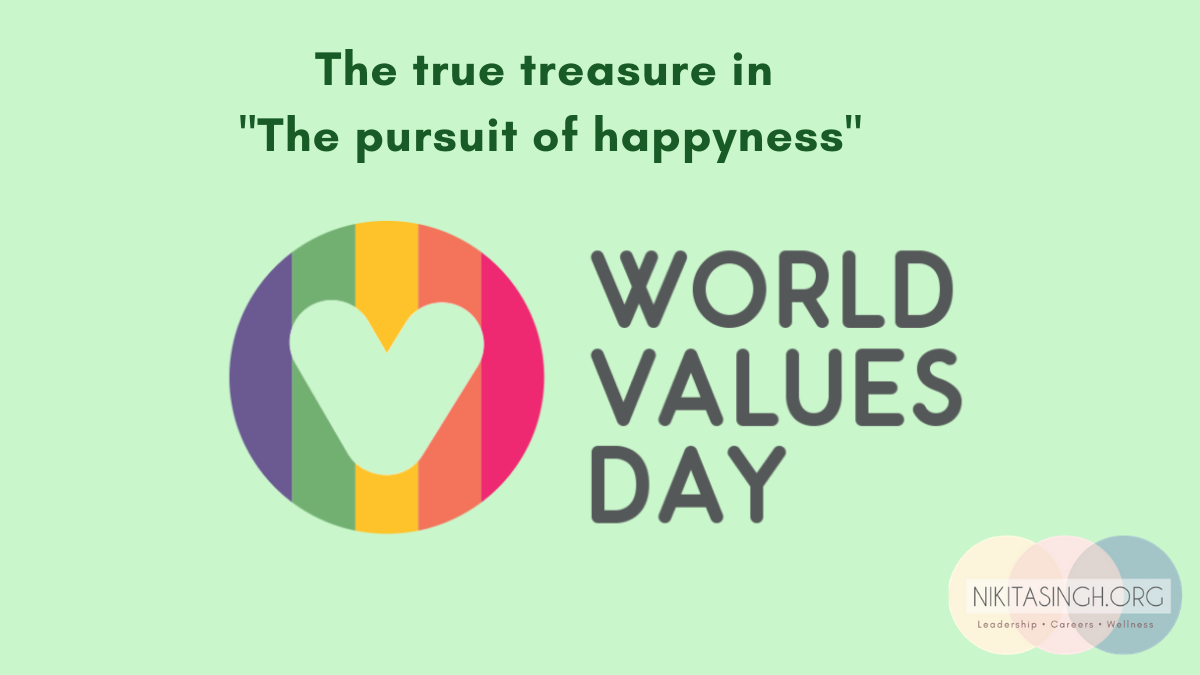On every single day, we have 60,000 thoughts. Though some of these thoughts are positive and helpful, sadly, over 80% of them tend to be negative and not particularly helpful. Not to say that these are undesirable thoughts and feelings – it is really our proclivity to hold on and get hooked to them that creates mental chatter and dissonance. This happens in two ways –
1. We treat our thoughts and emotions as real facts and,
2. What is worse, we even act on them (and perhaps regret it later?)
It is not about suppressing our emotions or inner experiences. Instead, it is our ability to view the situation through the lens of OUR VALUES and act accordingly. The mind’s thought stream flows endlessly, and emotions change like the weather, but values can be called on at any time, in any situation.
Organizations invest significant time and financial resources to identify their core values and inspire people to live by these. Yet, at a team or individual level, we tend to think of values as abstract or nice to have.
So, what are values?
As Harvard Psychologist and the author of Emotional Agility, Dr. Susan David puts it, “Values are qualities of purposeful action.” So, if an individual values ‘inclusion’, he or she has the choice of putting this value to action in the very next conversation. In any situation, we have the ‘choice’ to either move towards OR away from our values.
And, why do values matter?
In some of my recent leadership coaching conversations, when we have deep dived into values, it often creates an ‘aha’ moment. And this is grounded in neuroscience which postulates that our brain has 3 parts –
1. The Reptilian brain – Keeps the body safe, especially in moments of fear
2. The Emotional brain – Brings past learning into the moment, functions in terms of ‘right’ and ‘wrong’ and,
3. The Cerebral cortex – With over 16 trillion neuron connectors, this is all about our visioning capacity, i.e. seeing the big picture
Reflecting on our values and choosing to act on them help to bring the cerebral cortex in action. It is no wonder therefore that an outcome of leadership coaching conversations generally is a shift from downward spiral thinking to uplifting beliefs about the future.
Like Marcel Proust, the French novelist puts it, “The voyage of true discovery lies not in finding new landscapes, but in having new eyes.” So this is the power of values – without any shift in the situation or context, our behaviour and actions can change completely – only because we choose to lean on our values.
Dr. Susan David, in her book, highlights research which suggests that, “walking our values helps to enhance willpower, grit, resilience and well-being in our lives.”
A perspective that I have developed particularly whilst making difficult decisions is that values are like our own internalization of what ‘success’ means to us. For instance, X may interpret success as living a life filled with love and community, and Y may interpret it as achievement and recognition.
Most importantly, identifying and acting on our Values help us to avoid 3 common traps
- 1. Social Contagion – Social contagion is the idea that we catch on to others’ behaviours and actions, and adopt them. Look at what happens in our lives – we are constantly bombarded with messages about what is important and what makes us worthy. This makes it difficult for us to act on our values.
Here’s some research – a Stanford marketing professor tracked more than a quarter of a million airline passengers and proved that we are an overwhelming 30 percent more likely to make an in-flight purchase if our seatmate does! Sometimes, this behaviour might actually be beneficial. Let’s say if you emulate friends who eat healthy, you might be more likely to do so. However, making mindless, autopilot decisions will eventually mean living a life aligned with values we don’t necessarily subscribe to (not to mention the extra calories!)
- 2. Unconscious biases – Values can help us comprehend situations in which we find a disconnect between a stated belief and consequent actions. For instance, an organization that values fairness may unconsciously reward loyalty over merit. Therefore, continually aligning actions with values can obviate such dichotomies.
- 3. Impulsive action – If you go back 24 hours or 48 hours. At this very moment yesterday, did you have the same thoughts and feelings as you do right now? There’s a high probability the answer is no. But if I asked you whether your values were the same 48 hours ago as they are in this moment, you’re likely to say YES. This is why choosing to make decisions and live in alignment with our values keeps us squarely on terra firma.
We’ve said all this, but what happens when our values conflict with one another? – It’s like facets on a diamond. Sometimes, when you turn one side of a diamond to face you, another may have to move away – but it is still there, part of the whole, and visible through the prism. All we have to do is recognise it is there, and turn from one side of the diamond to the other at the right time. And so it is with conflicting values, for example: achievement at work vs. relationship with our partner, profitability vs. sustainability and so on.
You’re now probably wondering; how do I identify my values?
Here are some questions that can help you figure out your values
– What do I want my life to be about?
– If a miracle occurred, and all the anxiety & stress in my life were gone, what would my life look like and what new things would I pursue?
– As I look back on today, what did I actually find worth my time?
– If this was the last day on earth, how would I act to make it a great day? What do these actions tell me about what I value?
I would also highly recommend taking the Barrett Values Centre Personal Values Assessment. The Barrett Values Centre research and view on values identifies the seven areas that comprise human motivations.
Once you identify your values, ask yourself
– Are these fear based values or positive?
– How have my values changed over the last few years, and what does this tell me about my personal evolution?
– To what extent does my behaviour align to my values? – this is a particularly important question. Identifying with a value is not the same as acting on it always. When our behaviours are out of alignment with our values, we could come across as less authentic
On this World Values Day, let’s think of values as our reliable friends and trusted partners. Take time out to reflect on your core values, and more importantly, ACT on them.


